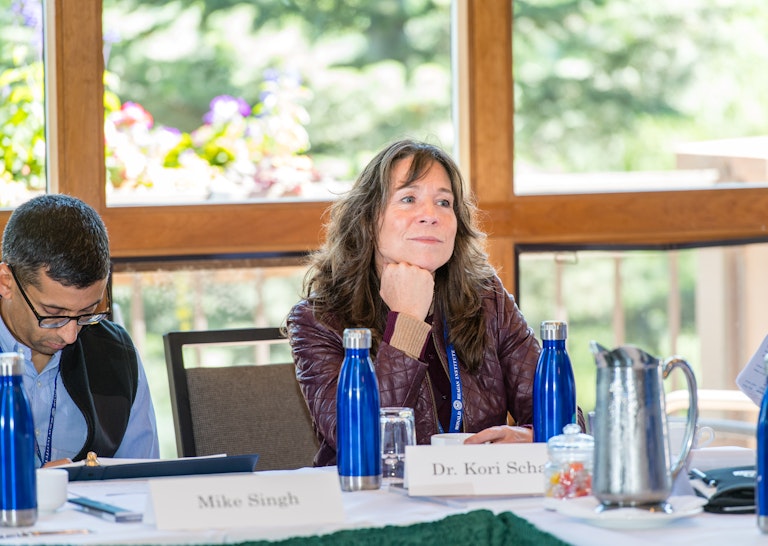Ronald Reagan Institute
The Future of Conservative Foreign Policy: Political Realities and Electoral Viability by Kori Schake
By Kori Schake

A Response from Kori Schake
My friend Paul Lettow has already taken the high road, advocating engaging young Americans with the inspiration of conservative principles. And I agree with him. In my experience, our foundational beliefs as conservatives do appeal to our successors. Our political problem is not that we cannot win over younger Americans to our principles, it is that we are failing to win over our contemporaries to those principles. That voters under age 30 voted for Democrats by a 35 point margin in 2018 is the result of that failure: they reject us because we don’t stand for our principles, not that they don’t.
This is not merely a short-term effect, perhaps even satisfying to conservatives who declined to vote or work for candidate and then President Trump. It’s true that only 25 percent of voters 18 to 29 years old approve of President Trump. But even signatories of the anti-Trump letters should not take validation in younger Americans’ rejection of our political party at this moment, because it will have longer term effects: 59 percent of millennial voters are now registered as Democrats. Party affiliation creates vestigial preference, even long after policy divergence has occurred.
“...they reject us because we don’t stand for our principles, not that they don’t.”
Nor should we be complacent that young Americans will age into conservatism. There’s actually no evidence of the phenomena. As Kim Parker of Pew concludes, “The differences we see across age groups have more to do with the unique historical circumstances in which they come of age.”
Americans under the age of 29 had as their formative experiences the age of terrorism, the mistakes of wars in Iraq and Afghanistan, and the 2008 financial crisis—all of which they associate with the Republican Party. And they revile the depredations of President Trump’s behavior and the procedural contortions by Senate Republicans to partisan purposes, like the refusal to vote on Supreme Court nominee Merrick Garland.
What we as a conservative movement look like to younger Americans is old, white, male, bigoted, and unprincipled—people who bray loudly at others breaking the rules but excuse ourselves doing so. It is profoundly self-defeating to blame higher education or peer pressure for young Americans fleeing the Republican Party, as Paul Gottfried does. To say “millennials vote for the Left because they have been conditioned to do so by social media, educational institutions, and their peers” is to consign our political movement to failure.
To adopt Gottfried’s approach is worse than accepting failure; it is a rejection of our conservative principles. To resign ourselves to externalizing the causes of our failure is to deny that policies have any effect on voters. It is to say they are incapable of reasoning their way to policies that advance their interests. Alexander Hamilton worried about this, writing in Federalist Paper No. 1 that “it seems to have been reserved to the people of this country, by their conduct and example, to decide the important question, whether societies of men are really capable or not of establishing good government from reflection and choice, or whether they are forever destined to depend for their political constitutions on accident and force.”
So we must not take refuge in believing young Americans are an unwinnable demographic, even though 51 percent of 18 to 29 year olds believe our country is on the wrong track. Only 22 percent of Republicans share that view; and 74 percent of Democrats believe the country is on the wrong track. So younger Americans are less critical than Democrats.
But younger Americans are less interested in what have traditionally been the mainstays of Republican policies: foreign policy, protecting against terrorism, and low taxes. This is not an argument for abandoning our traditional strengths in those areas; we need to demonstrate interest and facility beyond them. We cannot rely solely on the appeal of those policies, but ought instead to meet younger voters where they are and step forward as Paul Lettow advocates to win support for principles that drive policies in those areas.
So, to paraphrase Freud, what do younger Americans want? What do they care about? Their top concerns are climate change and health care. Only 8 percent of them think immigration is a problem. Even self-described and activist conservatives among younger Americans are more socially liberal than their elders, and they favor diversity. This generation gap, incidentally, does not parallel among Democrats. We Republicans have a generational schism that Democrats do not have.
But our generational chasm on the conservative side has advantages, because surmounting it will require agreement on foundational principles. We cannot take any Republican voters for granted, nor can we have only policies that attract younger people because the overlap of Venn diagrams for our voters across the age spectrum is not sufficient to the task of turning out election-winning majorities for our party. We are, happily, reliant on principles to take us beyond policy agreement.
At its most basic, conservatism rests on the dignity and judgment of individuals. We refer less to group identities than do liberals, and that is an advantageous starting point for connecting with younger Americans, because they, too, prize their individuality.
I absolutely agree with Paul that “a sober foreign policy vision that aims to preserve our strength, prosperity, and freedom of action for the long haul” is sellable, and that, as he writes in his excellent paper, the public is yearning for it. We Republicans have a long and proud tradition of that in foreign policy. But polling does not support his supposition that our fellow Americans view us as more trustworthy on national security issues; that is a net advantage to Democrats in our current moment. Neither are the president’s erratic policies regaining ground for Republicans; public attitudes are moving in opposition to his policies. Unless we roll our sleeves up and win this argument within the Republican Party, we will lose the larger argument with the American public.
Principles are the starting point and necessary to lay the foundation for policies that address younger Americans’ concerns. As Alex Murisianu has argued, we have conservative policies that speak to young Americans’ principal worry, which is the affordability of a middle-class lifestyle. Reducing regulations that block affordable housing, ensuring accessible and affordable health care, cutting the cost of higher education, protecting the environment, rebalancing entitlement programs’ intergenerational transfers of wealth, and promoting fiscal conservatism are all policy winners consistent with our conservative principles.
Those are not policies our Republican leaders in the Executive Branch and the Congress are practicing. And that is the inescapable rub: We cannot win younger Americans to conservative policies because we are not advocating conservative policies, and we cannot win younger Americans to conservative principles because we are not advocating conservative principles. We have to win this argument among our cohort before we can win over the future lifeblood of our party.
How to do that is, of course, the political question of the moment. Elected Republicans will for the most part support the president’s decisions as long as they consider them, or him, to have electoral resonance—or at least as long as they believe they cannot succeed with Republican voters by opposing him or advocating different policies. And we cannot fault them for believing getting elected is a precondition for the ability to enact policies. That is merely to say they are politicians.
As evidenced by no Republican of salience being willing to primary a sitting Republican president, our leading party politicians do not believe they can succeed with Republican voters by opposing President Trump or advocating different policies. Nor are our leading party politicians willing to break with the president on immigration, deficit spending, tariffs, or racially tinged travel restrictions. They have placed restrictions on the president’s ability to enact policies detrimental to our alliances in Europe and Asia and cuts to diplomacy. But for the most part, even when conservative principles are involved, our party leaders are leaving challenges to the president up to Democrats.
This argument about the future of conservatism will be won or lost not in the halls of Congress, but in Rotary Clubs and parish houses, city councils and school boards. There is simply no substitute for retail politics if we are to reclaim Republicanism for principled conservatism. And if we are to save conservatism as a political force in American life, we must all partake of it, finding ways to model the behavior and advocate the policies consistent with our conservatism. I find the most effective way to get traction in those venues is not to speak of lofty principles—redolent as they are to those of us who spend our professional time working on these issues—but to give concrete examples from which the principles can be derived. Americans may be leery of defending the liberal international order, but they viscerally oppose the Chinese government rounding up a million Uighurs into concentration camps. And even as they may be outraged at our government interning immigrants at the southern border, they still see a difference between border security to prevent uncontrolled immigration and forcible internment and reeducation of citizens.
We can, and should, have these conversations over and over because that is how we draw our fellow Americans—and the winnable 18- to 29-year-old constituents who could be the future of the conservative movement—into building a Republican future that is more conservative than the Republican Party leadership of our moment.
\The Future of Conservative Internationalism,\ which is a collection of essays from the Reagan Institute Strategy Group, convened in Beaver Creek, Colorado, in July 2019.
Join Our Newsletter
Never miss an update.
Get the latest news, events, publications, and more from the Reagan Institute delivered right to your inbox.
